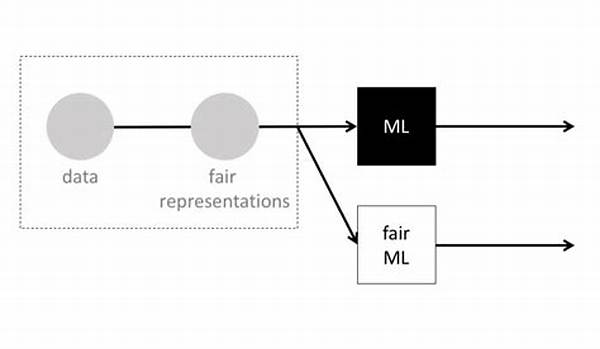Hey there, tech enthusiasts! Let’s dive into a topic that’s not just buzzy but genuinely crucial in the world of AI—fairness in machine learning. We’re not talking about the kind of fairness you argue with your siblings about, but rather about ensuring our beloved algorithms treat everyone equally. So, grab a cup of coffee, or your preferred energy booster, and let’s explore why this is a big deal.
Why Fairness in Machine Learning Matters
Ever think about how machine learning impacts your daily life? From social media feeds deciding what you see, to loan approvals, and even judicial decisions, machine learning is at the core. But, what happens when these algorithms get it wrong—especially in ways that affect people’s lives unfairly? That’s where the topic of fairness in machine learning swoops in as a superhero.
Ensuring fairness in machine learning means we’re actively working against biases that could creep into algorithms. And these biases are slippery little things. They can emerge from the training data which, more often than not, reflects the imperfections of human society. By addressing fairness, we’re basically ensuring that machines don’t amplify existing inequities, or create new ones. This topic is not just for the AI experts—or “the nerds” as some might lovingly call them—but for all of us. Trust me, as machine learning continues to shape our societies, understanding its fairness is crucial for everyone.
Simple Ways to Understand Fairness
1. Biased Data Concerns: The heart of fairness in machine learning is knowing that biased data leads to biased outcomes. It’s like a chain reaction of unfairness.
2. Transparency is Key: Ever hear of ‘black box’ algorithms? Fairness calls for making these complex algorithms as transparent as a glass window.
3. Inclusive AI Teams: Assemble diverse teams! This diversity helps ensure fairness in machine learning by including various perspectives in developing algorithms.
4. Continuous Monitoring: Fairness is not a one-time setting; it needs ongoing attention. Like a garden, it requires frequent upkeep to flourish.
5. Educating Stakeholders: Fairness in machine learning doesn’t stop at data scientists; everyone involved needs to understand their role in maintaining ethical AI systems.
Tackling Biases in Machine Learning Models
Let’s get real—nobody’s perfect, and neither are datasets! Most datasets inherit biases from the environments they were gathered from. When these biased datasets fuel machine learning models, they make it virtually impossible for fairness in machine learning to naturally occur. The truth is, any imbalance in data can skew results, favoring some groups over others.
Addressing these biases isn’t a walk in the park, but it’s totally worth the trek. There are several debiasing techniques available, ranging from reweighting data samples to completely redesigning algorithms to be more inclusive. The goal is to create models that represent people fairly, irrespective of their gender, race, or background. Because, at the end of the day, ensuring fairness in machine learning can make our digital world a genuinely better place for everyone.
Strategies for Incorporating Fairness
1. Algorithmic Audits: Conduct regular checks to ensure fairness in machine learning models by looking at how decisions are reached.
2. Fairness Metrics: These specialized metrics evaluate the level of fairness in machine learning systems, shining a spotlight on any problematic areas.
3. Feedback Loops: Incorporate user feedback continuously to refine machine learning models, making them more equitable over time.
4. Cross-disciplinary Collaborations: Engage experts from various fields to tackle fairness in machine learning from all angles.
5. Bias Detection Tools: Use sophisticated tools designed to detect biases before they can affect outcomes, ensuring fairness in machine learning processes.
6. Policy Development: Draft policies that emphasize the importance of fairness, providing a framework for maintaining ethical standards in AI.
7. Training Programs: Develop educational initiatives to teach all stakeholders about the importance of fairness in machine learning and related best practices.
8. Robust Testing Scenarios: Create more rigorous testing environments to anticipate how algorithms may react under different, and perhaps unintended, circumstances.
9. Open Dialogue: Maintain conversation channels that facilitate discussions about fairness in machine learning, encouraging transparency and problem-solving.
10. Ethical Reviews: Set up boards to perform ethical reviews of machine learning algorithms, ensuring they uphold the highest fairness standards.
The Future of Fairness in AI
Picture this: a world where no one is left behind by technology. Sounds dreamy, right? But funnily enough, it’s totally within reach if we prioritize fairness in machine learning. The future is looking tech-heavy, meaning that AI systems will play larger roles in decision-making processes—from hiring to healthcare. This underscores the urgency in eradicating bias from these automated systems.
As more organizations recognize the importance of this issue, there’s an ever-growing focus on creating fair and unbiased AI technologies. Regulators are honing in, too, pushing for legislation that governs the ethical use of AI. Developers, researchers, and tech companies are collaborating to address fairness at every turn, bringing our dream of fair technology closer by the day. By making fairness in machine learning a central goal, we ensure tech evolves to benefit the many, rather than the few.
Fostering Global Discussions
Let’s have a moment of honesty here—fairness in machine learning isn’t just a techy concern. It’s a global conversation that needs diverse voices and perspectives at the table. After all, machine learning is a tool, and how it gets used will ultimately reflect the collective values of those who build and deploy these systems.
By fostering international collaborations and discussions, we open doors to knowledge sharing that significantly boosts fairness in machine learning. Cultural contexts and local needs matter, too, so having varied input helps create systems that are inclusive no matter where they’re used. Our tech future should be a collective one, where fairness in machine learning is seen as a shared responsibility. In doing so, we’ll be paving the way for innovative solutions that honor the pluralistic societies we all come from.

